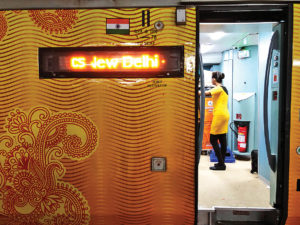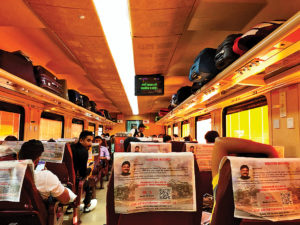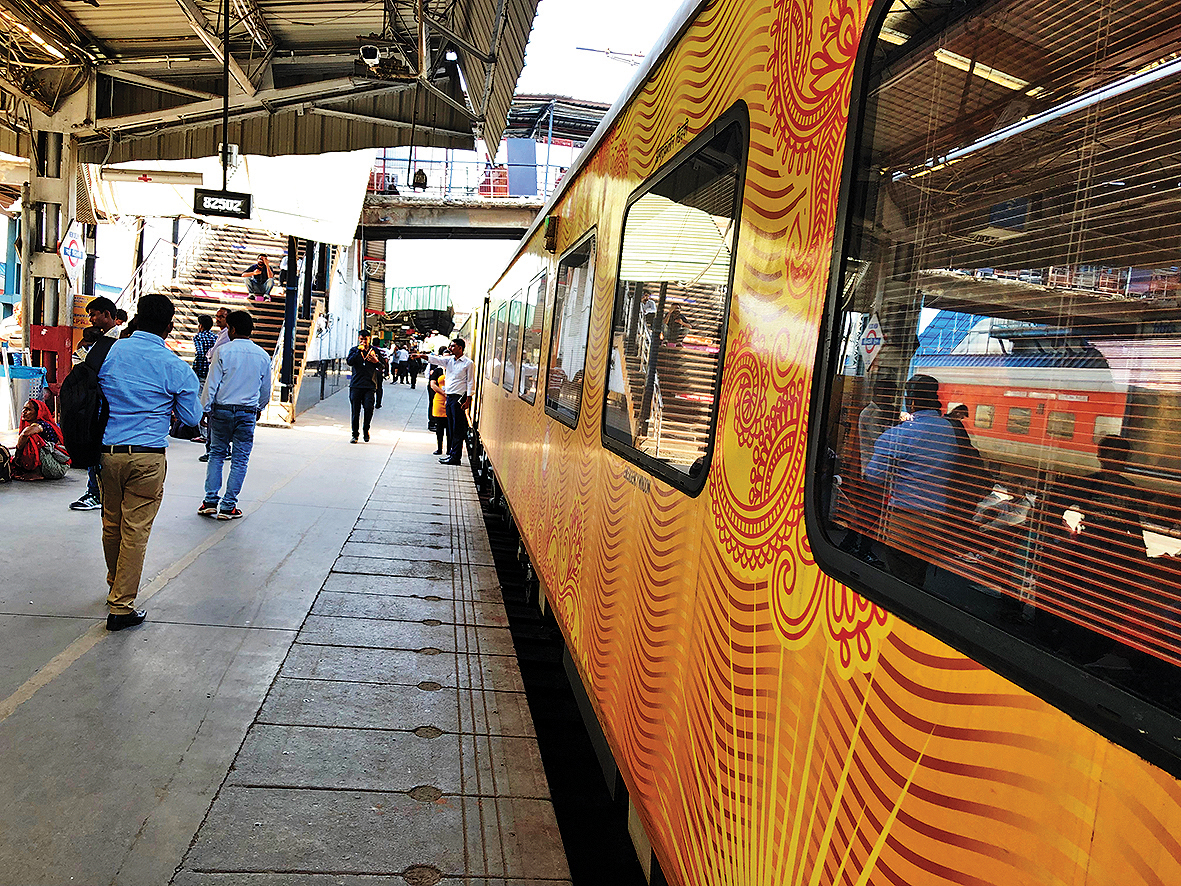India’s first private train is as plush as the Swarn Shatabdi but after the initial excitement wears off, it may not be the best option for travel to Lucknow
Platform No. 9 at the New Delhi railway station has acquired a touch of glamour these days as India’s first private train, Tejas Express from Delhi to Lucknow and back originates from here. The platform gets more footfall these days as it attracts passengers, hawkers, workers and porters who want to get a glimpse of it and also peek inside. Personnel of the Railway Protection Force (RPF) are more conspicuous than usual and a series of officials are seen running around to attend to the incoming passengers.
A round of the train run by the Indian Railways Catering and Tourism Corporation (IRCTC) reveals curious onlookers clicking selfies alongside the Tejas. This reporter met Tejas Express’ in-charge Amit Kumar Sinha, who was quite busy accommodating senior railway officials.
Asked why the ticket was priced at Rs 1,502 when it was officially announced that the New Delhi-Kanpur fare will be Rs 1,135, Sinha said, “The fares of Tejas Express are flexible. It fluctuates with the availability of seats, unlike other trains.”

Incidentally, you cannot buy a ticket from New Delhi to Ghaziabad, although the Tejas Express has two halts in its journey till Lucknow — one at Ghaziabad and other at Kanpur. Sinha said, “It’s a technical stop, mostly for boarding, as the distance is just around 35-40 km. IRCTC doesn’t offer any tickets for it.”
A makeshift inquiry office has been opened up by the IRCTC at the Platform 9 itself, which basically serves to answer queries and for booking last-minute tickets. Some passengers had missed their train (Shramjeevi Express), others said that their train got cancelled (Humsafar Express). The last-minute bookings must have been a bonanza for IRCTC, if you take the fluctuating rate into account.
The entry point of every coach of Tejas Express is attended by an IRCTC official who asks for the ticket, unlike other trains where anyone can enter. The gates open automatically. Welcoming the passengers are the coach crew, and one certainly gets the feel of a plane journey. The inside door is also automatic, and the first look gives an impression of luxury, creating a mirage for passengers. All the seats have a newspaper and a magazine, while the crew helps those in need of help to find their seats and park their luggage. The chairs are comfortable with a pulley and ample leg space. The window panes have an automatic shutter system. All these features mirror India’s former fastest train Swarn Shatabdi.
Fellow passenger Rakesh, a chemical engineer, said that although privatisation is fine and could be the “need of the hour”, private players shouldn’t be given “wholescale liberty to operate.” Asked to elaborate, Rakesh said, “Today, it’s Ambani, Adani, Tata and Birla who are majorly holding the reins of our market. Reliance Industries, he says, is the best example bet that private players should have some restrictions overhead. Rakesh accused RIL of selling fuel in India and outside of it as per market needs. He said, “When the prices of crude oil plunged, the RIL opened up its petrol pumps in India and as soon as the situation reversed, Ambani’s shut down their pumps. Eventually it’s the common man who suffers.”
Advising the government about the pros and cons of privatising every sector, Rakesh told Patriot, “An equilibrium is required between the public and the private investment, the government should avoid giving entire control to the private players as it could turn out to be a blunder.”
On Tejas, a bottle of water named Rail Neer is provided, packaged by the IRCTC. The specialty of this bottle is that it is a biodegradable PET bottle in accordance with the new rule to ban single-use plastic. Every seat has two charging ports, a bell to call the coach crew for any assistance and a personal light for reading.
Almost 30-40% of the seats were vacant when the train left New Delhi. When Patriot interacted with several crew members, they said the seats would get filled as and when Ghaziabad arrives. This did happen, but the train was not 100% full. Although the train lacks free wi-fi service, Magic Box, a pre-downloaded entertainment website is provided: one can surf movies, songs and serials. In the middle of the journey, the crew members could be seen selling earphones and headphones, just as they do in aeroplanes.
On questioning the crew, I discovered that some were working for the first time, like Apurva Verma and some were still completing their graduation. Apurva said, “My colleagues here are still in their final year of B Com (Bachelors in Commerce).
The washrooms of Indian railways are usually in a deplorable condition, but here the scenario is different. In Tejas Express, the water taps are sensor controlled while the flush had automatic vacuum system. It could be a gamechanger for other Indian trains if the same automatic vacuum system is adopted.
Dinner was served at 7 pm. The platter contained shahi paneer, yellow dal, mix vegetables, rice, two chapatis, curd, pickle and a sachets of hand sanitizer. Post the dinner, a cup of vanilla ice cream was also provided for dessert. The actual time of arrival at Kanpur Central was 8:40 pm but with a green signal at almost all the junctions and minor stations, the Tejas Express arrived at Kanpur at 8:15 pm, which was 25 minutes earlier than the scheduled arrival time.

A passenger in the C5 coach while getting down at Kanpur station commented that “It’s the duty of this new train to reach its destination earlier than expected because then only the passengers will board the train otherwise Shatabdi is the best option.”
While the IRCTC has clearly highlighted the flexible fares on its website, a report in The Hindu has claimed that India’s first corporate train has violated the Railways Act, 1989 as it’s the central government which is the competent authority to decide upon the tariff and not the IRCTC. The Delhi-Lucknow Tejas Express takes 6 hours and 30 minutes to cover the 51-km distance with halts at Ghaziabad and Kanpur Central. The train charges Rs 2,450 for AC Executive Class and Rs 1,565 for the AC Chair Car including GST and catering.
In fact, its speed is not much better than the Delhi-Lucknow Shatabdi Express which takes 6 hours 35 minutes to cover the same distance even though it has five halts: Ghaziabad, Aligarh, Tundla, Etawah and Kanpur Central. The fare is Rs 1,855 for AC Executive Class and Rs 1,165 for the AC Chair Car including GST, Super-Fast and reservation charges.
As per Section 30(1) of the Railways Act, “The Central Government may, from time to time, by general or special order fix, for the carriage of passengers and goods, rates for the whole or any part of the railway and different rates may be fixed for different classes of goods and specify in such order the conditions subject to which such rates shall apply.”
A penalty can be imposed if any violation takes place. Section 169 of the Railways Act says, “If a non-Government railway fails to comply with any requisition made, decision or direction given by the Central Government, under any of the provisions of this Act, or otherwise contravenes any of the provisions of this Act, it shall be open to the Central Government, by order, to levy a penalty not exceeding two hundred and fifty rupees and a further penalty not exceeding one hundred and fifty rupees for every day during which the contravention continues…”





